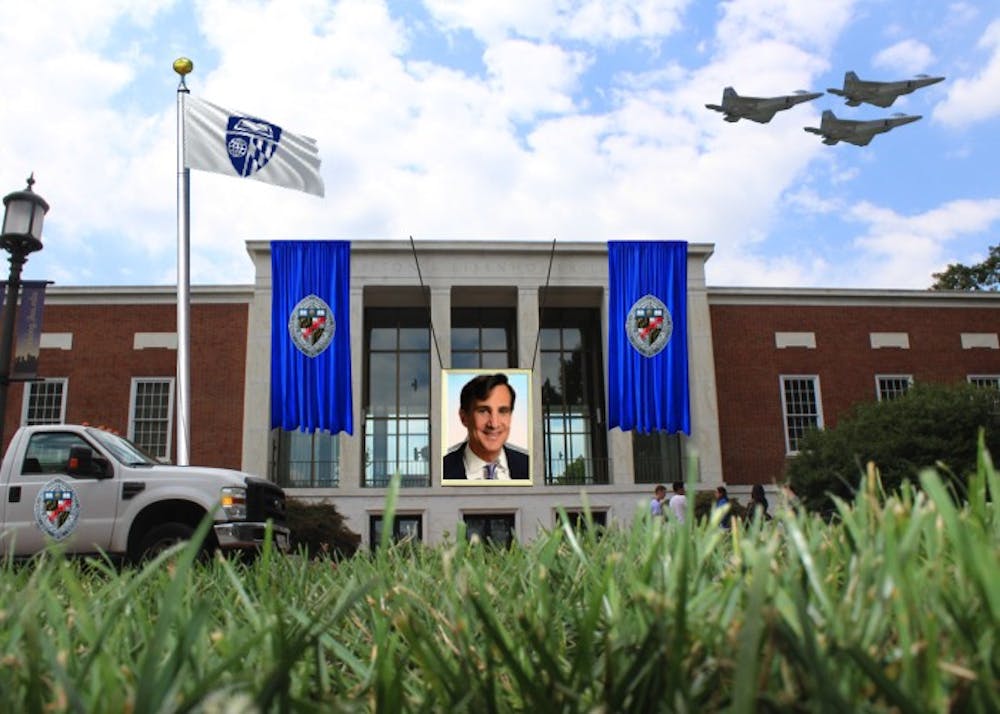APRIL FOOL’S: This article was published as part of The News-Letter’s annual April Fool’s edition, an attempt at adding some humor to a newspaper that is normally very serious about its reporting.
Last Monday, in an unexpected schoolwide email, the University announced that it is seceding from Baltimore City, effective immediately. This email comes on the heels of Hopkins announcing that it intends on forming its own private police force and of years of purchasing nearby properties at the East Baltimore and the Homewood campuses.
The email, written by University President Ronald J. Daniels and Hopkins Medicine CEO Paul B. Rothman, declared that the school made this decision after much deliberation.
“There’s this saying ‘if you love something, let it go.’ We’ve always loved Baltimore so much, and that is why we are letting it go,” Daniels and Rothman wrote.
Daniels and Rothman explained how the ultimate rationale behind their decisions was “preserving the Hopkins way of life.”
“Let us be clear that this is a University Rights issue,” they wrote. “This isn’t about evading municipal taxes, being racist or anything like that. We just want to preserve our Hopkins heritage and continue to administrate the same way our fore-administrators administrated.”
Few administrators outside of Daniels and Rothman knew of this decision beforehand, and many were caught off guard. Executive Director for the Center for Social Concern Wyatt Gildt questioned Daniels and Rothman’s announcement.
“What the fuck?” Gildt said. “Just how? Why? Goddamn it, why does the school make my job so hard?”
Many Baltimore City government officials were also surprised by the University’s announcement. City Mayor Catherine Pugh reassured the public that the city government still hopes to maintain strong ties with Hopkins.
“We are monitoring the situation. I just want to reiterate that they are the largest private employer in the City and we don’t want to do anything that is going to further provoke them,” Pugh said in a press conference. “We can’t offer them any more tax breaks if they’re leaving, so we need to think of something else to keep them happy.”
Deputy Director of Communications Suzanne Bridges argued that secession was the next logical step for the University.
“Hopkins already has its own independent transportation system in the form of the JHMI. We are in the process of forming our own private police department, and we have spent the past 10 years facilitating property development in places like 9 East and R House,” Bridges said. “We have essentially been operating independent of the City for quite a while now, we just decided to make it official.”
Bridges also pointed out how Hopkins made this decision after consulting with peer institutions.
“A lot of other schools are in places with a ‘collegetown’ feel,” she said. “We never really got that from Baltimore so that’s why we decided it would be best to leave and rebrand ourselves.”
The admissions office in Mason Hall has already removed all references to the University’s presence in Baltimore from all of its propaganda material. Many in the office were excited about the change, as many prospective parents are concerned about safety in Baltimore.
Dean of Undergraduate Admissions Eileene Kimberle explained how they were preparing to receive a large amount of applications for the Class of 2023.
“Safety concerns and paranoia about Baltimore were the biggest things holding families back from wanting their kids to be Blue Jays,” she said. “Admissions tours are going to be so much easier without every other question being about whether Baltimore is safe.”
Critics have argued that the University is seceding to avoid paying taxes. In November, Hopkins was implicated in the Paradise Papers leak, which revealed how elite individuals and institutions hid their assets in offshore accounts to avoid taxation by the U.S. government.
The University did not indicate whether it will remain a part of the United States following the secession. Senior Vice President for Finance and Administration Daniel Ennis did not respond to questions about whether Hopkins plans on paying federal taxes.
“The University does not comment on its own financial matters,” he said. “But just between you and me...”
He then proceeded to wink at The News-Letter’s reporter during the interview.
Though the University said that it had communicated its decision beforehand to community members, many neighborhood associations stated that they were caught unaware, though they were not particularly surprised by the decision.
“Don’t those kids already live in that thing they call the Hopkins Bubble?” Marty N. Calvert, chair of the East Baltimore Community Collective, said. “I never really saw Hopkins as a part of Baltimore to begin with, and it doesn’t seem like they’re going to stop screwing us, so it doesn’t matter to me.
Students are conflicted about secession. Co-president of Students for a Democratic Society Carlos Marks explained both the pros and the cons to secession.
“Throughout history, Hopkins has been a parasite sucking away City resources and treating local residents like guinea pigs for research. But if we were to stay, the school also has a lot of assets and resources to redistribute back to the most disadvantaged in the Baltimore,” Marks said. “At the end of the day, we are upset at the University no matter what.”
Others pointed out how they were specifically upset with how the school made and shared its decision.
“Do we even have any say in how this school is run?” Senior Linus Li said. “From covered grades to private police, I never felt like my voice or input was represented. Honestly, it might be time for students to secede from Hopkins.”
Li has since started a petition among the student body calling for student secession. The petition states that students are “sick of this shit” among other concerns. As of press time, the petition has garnered 15,660 signatures.





